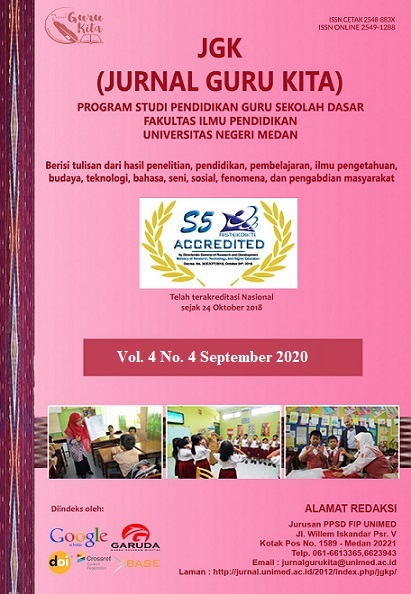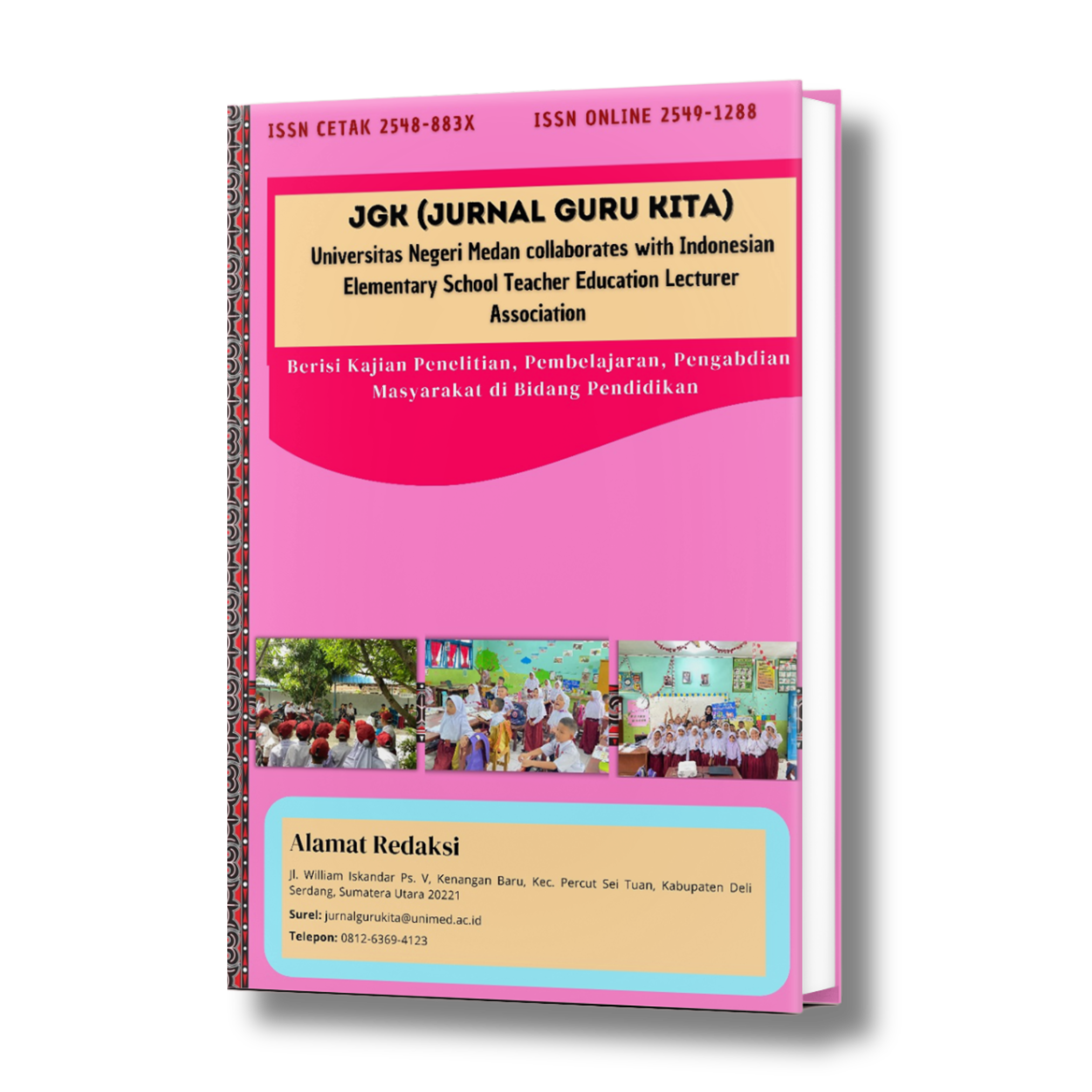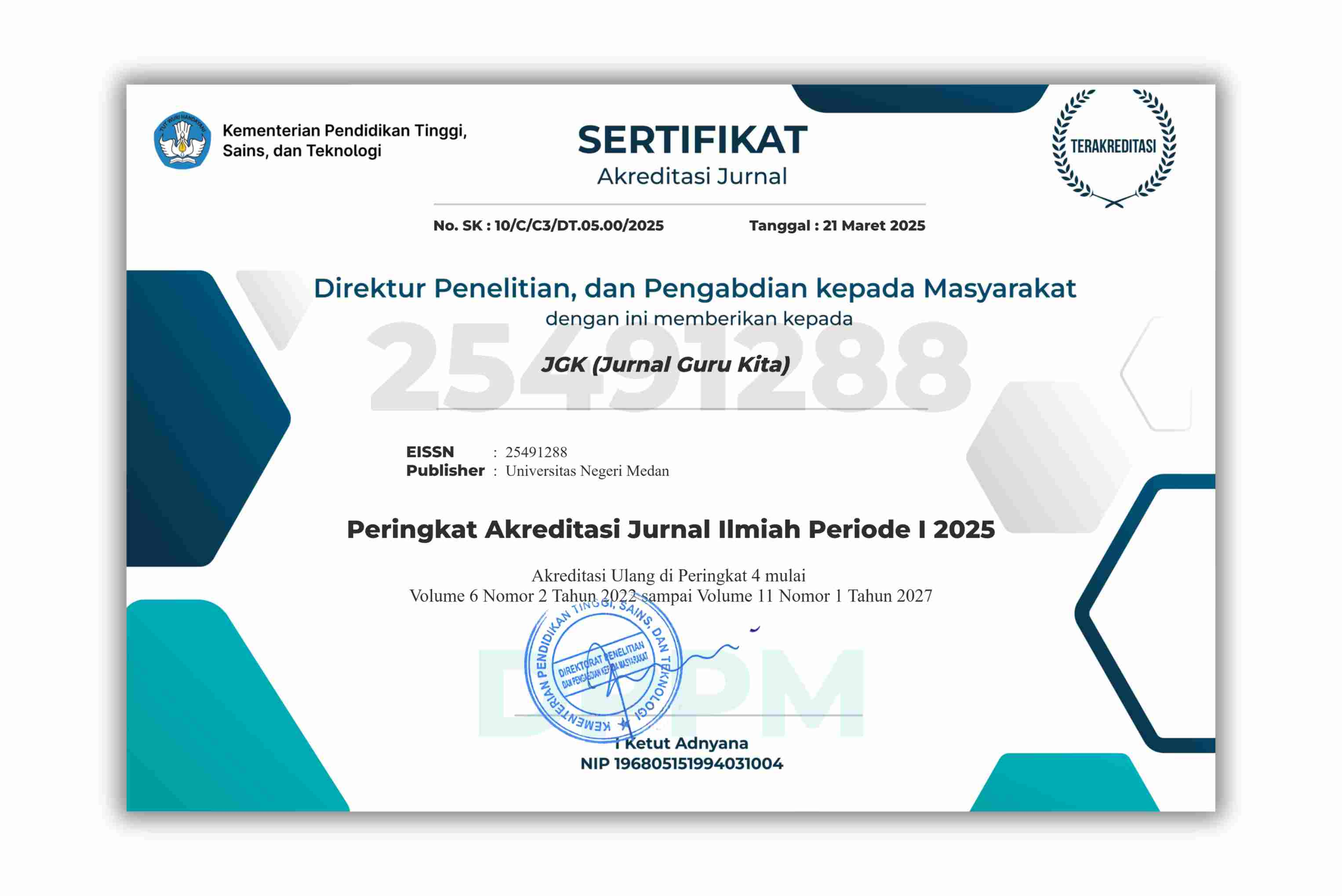PERSEPSI DOSEN TERHADAP PELAKSANAAN PEMBELAJARAN ONLINE SELAMA PANDEMI COVID-19
DOI:
https://doi.org/10.24114/jgk.v5i4.27986Keywords:
lecturer’s perception, online learning, persepsi dosen, pembelajaran onlineAbstract
Abstract: Lecturers™ perception on the implementation of online learning during pandemic of Covid-19. This research aims to explore lecturers™ perception on the implementation of online learning during pandemic of Covid-19. It employs descriptive qualitative method. Using purposive sampling technique, it collects the data from interviewing 5 lecturers of one private university in Sumedang. Its findings suggest the lecturers perceive that the online learning implementation during Covid-19 pandemic poses some problems. Unstable internet connection is one of the main problems both students and lecturers have to go through. Some problems also occurred in the use of Learning Management System (LMS) which can still be solved by changing its learning platforms or transition from synchronous to asynchronous instructions. It suggests that some improvement is needed to ensure the quality of online learning in the long run. Keyword: lecturer™s perception, online learning Abstrak: Persepsi Dosen Terhadap Pelaksanaan Pembelajaran Online Selama Pandemi Covid-19. Tujuan penelitian ini adalah untuk mengetahui persepsi dosen terhadap pelaksanaan pembelajaran onlineselama pandemi COVID-19. Metode penelitian yang digunakan adalah penelitian kualitatif deskriptif . Data dalam penelitian ini didapatkan melalui teknik purposive sampling dengan mewawancarai lima orang dosen salah satu perguruan tinggi swasta di Kabupaten Sumedang. Hasil penelitian menunjukkan bahwa persepsi dosen terhadap pembelajaran online selama Covid-19 masih menemukan kendala di dalam proses pelaksanaannya. Kendala yang muncul berasal dari jaringan internet yang tidak stabil baik yang terjadi pada dosen ataupun mahasiswa. Juga kendala dari LMS yang digunakan karena kadang menemui masalah. Meskipun sejauh ini masih bisa ditangani dengan mengambil langkah solutif berupa berpindah pada platform lain ataupun pembelajaran yang awalnya akan dilaksanakan secara synchronous berganti menjadi asynchronous, tetap diperlukan perbaikan-perbaikan agar proses pembelajaran online bisa menjadi lebih baik ke depannya. Kata kunci: persepsi dosen, pembelajaran onlineReferences
Alwasilah, A. C. (2000). Pokoknya kualitatif: Dasar-dasar merancang dan melakukan penelitian kualitatif. Bandung, Indonesia: PT. Dunia Pustaka Jaya.
Anggianita, S., Yusnira, Rizal, M. S. (2020). Persepsi guru terhadap pembelajaran daring di Sekolah Dasar Negeri 013 Kumantan. Journal of Education Research, 1(2), 177-182.
Boettcher, J. V., & Conrad, R. M. (2010). The online teaching survival guide: Simple and practical pedagogical tips. Hoboken, NJ: John Wiley & Sons.
Cohen, L., Manion, L., & Morrison, K. (2007). Research methods in education. New York, NY: Routledge.
Cooney, T. J. (2001). Considering the paradoxes, perils, and purposes of conceptualizing teacher development. In F. L. Lin (Ed.), Making Sense of Mathematics Teacher Education (pp. 9“31). Dordrecht: Kluwer Academic Publishers.
Creswell, J. W. (2009). Research design: Qualitative, quantitative, and mixed methods approaches (Third edition). Thousand Oaks, California: SAGE Publications, Inc.
Dhawan, S. 2020. Online Learning: A Panacea in the Time of COVID-19 Crisis. Journal of Educational Technology Systems.49(1), 5-22. doi:10.1177/0047239520934018.
Dubey, B. & Singh, S. (2020). Perception of teachers on online teaching in higher education during COVID-19 lockdown. International Journal of Creative Research Thoughts, 8(5), pp. 1017-1022.
Dudeney, G. & Hockly, N. (2007). How to teach English with technology. Essex, England: Pearson Education Limited.
Fraenkel, J. R., Wallen, N. E., & Hyun, H. H. (2011). How to design and evaluate research in education. New York, NY: McGraw-Hill.
Fuster, D. (2019). Qualitative Research:Hermeneutical Phenomenological Method.Propósitos y Representaciones, 7(1), 201-229. Doi:http://dx.doi.org/10.20511/pyr2019.v7n1.267
Hamid, R., Sentryo, I. &Hasan, S. (2020). Online learning and its problems in the Covid-19 emergency period. Jurnal Prima Edukasia, 8 (1), 2020, 86-95.
Kafle, N. P. (2011). Hermeneutic phenomenological research method simplified. Bodhi: An Interdisciplinary Journal, 5, 181-200.
Keeton, M. T. (2004). Best online instructional practices: Report of phase I of an ongoing study. Journal of Asynchronous Learning Networks, 8(2), 75“100.
Kendrick, A. H. (2018). Inspiring Change: A Hermeneutic Phenomenology Exploring the Lived Experience with Emotional Labor by Female Health Champions Implementing Comprehensive School Health Reforms (unpublished doctoral thesis). University of Calgary, Calgary, AB. doi:10.11575/PRISM/32350
Khan, B. (2005). Managing e-learning strategies: Design, delivery, implementation and evaluation. Hershey, PA: Idea Group Inc.
Kodrat, D. (2020b). Mindset Shift in Cyber Pedagogy: A Teacher™s Strategy upon Learning fromHome. Jurnal Kajian Peradaban Islam, 3(2), pp. 27-32. https://doi.org/10.47076/jkpis.v3i2.49
Lee, T. S., Tsai, H. J. (2005). The effects of business operation mode on market orientation learning orientation and innovativeness. Industrial Management & Data Systems, 105(34), 325-348. https://doi.org/10.1108/026355705105 90147
Nunan, D. (1992). Research methods in language learning. Cambridge, England: Cambridge University Press.
Nassoura. Measuring students perceptions of online learning in higher education. International Journal of Scientific & Technology Research,9(4), 1965-1970.
Partlow, K. M., &Gibbs, W. J. (2003). Indicators of constructivist principles in internet-based courses. Journal of Computing in Higher Education, 14(2), 68“97.
Permana, G. K, dkk. (2013). Persepsi peserta didik dan guru terhadap pelaksanaan pembelajaran berbasis e-learning di SMK Negeri 4 Jakarta. Jurnal Pensil 2(2). 111-117.
Rigianti, H. A. (2020)Kendala Pembelajaran Daring Guru Sekolah Dasar di Kabupaten Banjarnegara.Jurnal Pendidikan dan Pembelajaran Ke-SD-an. Elementary School, 7 (2).297-302.
Satrianingrum, A. P. & Prasetyo, I. (2021). Persepsi guru dampak pandemi COVID-19 terhadap pelaksanaan pembelajaran daring di PAUD. Jurnal Obsesi, 5(1), 633-640.
Sims, R., Dobbs, G. and Hand, T. (2002). Enhancing quality in online learning: scaffolding planning and design through proactive evaluation. Distance Education, 23 (2), pp. 135-148.
Sun, S. (2014). Learner Perspectives on Fully Online Language Learning. Distance Education, 35(1), 18“42. https://doi.org/10.1080/01587919.2014.891428
Todd, R. W. (2020). Teachers™ perceptions of the shift from the classroom to online teaching. International Journal of TESOL Studies, 2(2), pp. 4-16. https://doi.org/10.46451/ijts.2020.09.02
UNESCO. (2020). School closures caused by Coronavirus (Covid-19). Retrieved from https://en.unesco.org/covid19/educationresponse
Windiarti, S., Fadilah, N., Dhermawati, E., & Pratolo, B. W. (2019). Teachers™ perception toward the obstacles of e-learning classes. Journal of Language Teaching and Literature, 6(2), pp. 117 “ 128. DOI: https://doi.org/10.30605/25409190.v6.117-128
Downloads
Published
How to Cite
Issue
Section
License
Authors published with the JGK (Jurnal Guru Kita) agree to the following terms:
- Authors retain copyright and grant the journal the right of first publication with the work simultaneously licensed under a Creative Commons Attribution License (CC BY-SA 4.0) that allows others to share the work with an acknowledgment of the work's authorship and initial publication in this journal.
- Authors are able to enter into separate, additional contractual arrangements for the non-exclusive distribution of the journal's published version of the work (e.g., post it to an institutional repository or publish it in a book), with an acknowledgment of its initial publication in this journal.
- Authors are permitted and encouraged to post their work online (e.g., in institutional repositories or on their website) prior to and during the submission process, as it can lead to productive exchanges, as well as earlier and greater citation of published work. (See The Effect of Open Access)

























